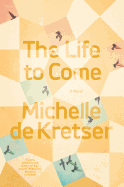
Michelle de Kretser's virtuosic novel The Life to Come labors quietly to find genuine human connection in a superficial and alienating world.
De Kretser (Questions of Travel) is a Sri Lankan-born Australian writer who has an extraordinary talent for both satire and impressionism. The Life to Come is a modern-day mosaic that follows multiple Australians in Sydney and abroad in Paris, as well as immigrants with roots in Sri Lanka. Three characters stand out: Celeste imagines a more fuller life with her Parisian lover, while Pippa tries desperately to make her mark as a writer among Sydney's upper-crust literati. Christabel, Pippa's neighbor, is a Sri Lankan immigrant who searches for consolation after her lifelong friend and roommate, Bunty, dies.
By turns acerbic and evocative, de Kretser's prose works like acid to melt away perceived realities until her characters are baffled by more fundamental truths beneath the surface. The surface dissolved most efficiently is that of white luxury liberalism. Pippa espouses multicultural views and takes great pains to advertise her own virtue on social media, while treating minorities in real life with paternalistic disdain. The most disturbing scene shows Pippa posting tweets in support of her Muslim friend Rashida, while fantasizing about the woman's death because of the attention she's received from family members, including Pippa's husband. In counterpoint to this hypocrisy stands the fortifying journey of Christabel, who in "one stark, superb gesture" dispenses with Pippa's façade and claims her own life.
At one point in the novel, the characters discuss the "ethics of possibility," what the new world may look like by way of globalization and changing attitudes. In its last pages, The Life to Come intimates an era of hope. --Scott Neuffer, writer, poet, editor of trampset

